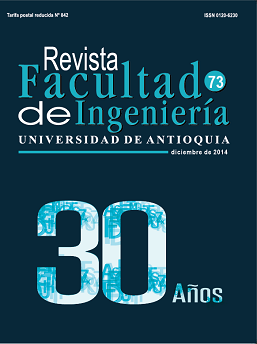Influence of data quality in the preferences of citizens in Municipal e-Government applications
DOI:
https://doi.org/10.17533/udea.redin.16820Keywords:
e-Government, Municipal e-Government, data qualityAbstract
The e-Government represents the government-citizen relationship, through the use of information technologies. Through e-Government the governments, offer different utilities and information, trying with this, to make life easier for citizens and to facilitate the public administration. This implies, among other things, strong data exchange between government and citizens. This leads us to think that the quality of the data could become an important factor when attempting to promote the use of e-Government. Consequently, this article focuses on studying the views of citizens regarding the presence of data quality in Municipal e-Government applications. Concretely, the case study, has shown that citizens recognize and prefer an application with improved data quality.
Downloads
References
D. McClure. Electronic government: Federal initiatives are evolving rapidly but they face significant challenges. GAO/T-AIMD/GGD-00-179. Ed. General Accounting Office. Washington, USA. 2000. pp. 1-19.
S. Hobson, R. Anand, X. Liu, J. Yang, J. Lee. Information quality issues in municipal governments. Proceedings of the IEEE International Conference on Service Operations, Logistics, and Informatics (SOLI). Beijing, China. 2011. pp. 126-131. DOI: https://doi.org/10.1109/SOLI.2011.5986541
F. Corradini, A. Polzonetti, B. Re, L. Tesei. “Quality of service in e-government underlines the role of information usability”. International Journal of Information Quality. Vol. 2. 2008. pp. 133-151. DOI: https://doi.org/10.1504/IJIQ.2008.022960
B. Kahn, D. Strong, R. Wang. “Information quality benchmarks: product and service performance”. Communications of the ACM. Vol. 45. 2002. pp. 184- 192. DOI: https://doi.org/10.1145/505248.506007
M. Eppler. “The concept of information quality: an interdisciplinary evaluation of recent information quality frameworks”. Studies in Communication Sciences. Vol. 1. 2001. pp. 167-182.
International Organization for Standardization/ International Electrotechnical Commission. Software engineering-Software product Quality Requirements and Evaluation (SQuaRe) Data quality model. ISO/ IEC 25012:2008. Geneva, Switzerland. 2008. pp. 1-13.
F. Hsu, T. Chen. Understanding Information Systems Usage Behavior in E-Government: The Role of Context and Perceived Value. Proceedings of the 11th Pacific Asia Conference on Information Systems. Auckland, New Zealand. 2007. pp. 477-490.
H. Abdelsalam, C. Reddick, H. ElKadi. “Success and Failure of Local E-Government Projects: Lessons Learned from Egypt”. International Journal of Information Communication Technologies and Human Development. 2012. Vol. 4. 2012. pp. 24-38. DOI: https://doi.org/10.4018/jicthd.2012010102
D. Gilbert, P. Balestrini, D. Littleboy. “Barriers and benefits in the adoption of e-government”. International Journal of Public Sector Management. Vol. 17. 2004. pp. 286-301. DOI: https://doi.org/10.1108/09513550410539794
H. Hsu. “An empirical study of web site quality, customer value, and customer satisfaction based on e-shop”. The Business Review. Vol. 5. 2006. pp. 190- 193.
S. Piotrowski, Y. Liao. The Usability of Government Information: The necessary link between transparency and participation. Proceedings of the 1st Global Conference on Transparency -Research, Rutgers University. New Jersey, USA. 2011. pp. 77-98.
C. Fuentes, A. Caro, A. Rodríguez. Calidad de datos en las aplicaciones de e-Government Municipal, una Revisión Sistemática de la Literatura. Proceedings of the Congreso Internacional de Computación e Informática del Norte de Chile, Infonor-Chile. Coquimbo, Chile. 2013. pp.1-9.
K. Yang, S. Rho. “E-government for better performance: Promises, realities, and challenges”. International Journal of Public Administration. Vol. 30. 2007. pp. 1197-1217. DOI: https://doi.org/10.1080/01900690701225556
W. Chutimaskul, S. Funilkul, V. Chongsuphajaisiddhi. The quality framework of e-government development. Proceedings of the 2nd international conference on Theory and practice of electronic governance. Cairo, Egypt. 2008. pp. 105-109. DOI: https://doi.org/10.1145/1509096.1509117
P. Missier, G. Lalk, V. Verykios, F. Grillo, T. Lorusso, P. Angeletti. “Improving data quality in practice: a case study in the italian public administration”. Distributed and Parallel Databases. Vol. 13. 2003. pp. 135-160. DOI: https://doi.org/10.1023/A:1021548024224
S. Funilkul, W. Chutimaskul, V. Chongsuphajaisiddhi. “E-government information quality: a case study of Thailand”. Electronic Government and the Information Systems Perspective. Vol. 6866. 2011. pp. 227-234. DOI: https://doi.org/10.1007/978-3-642-22961-9_18
J. Gil, T. Pardo. “E-government success factors: Mapping practical tools to theoretical foundations”. Government information quarterly. Vol. 22. 2005. pp. 187-216. DOI: https://doi.org/10.1016/j.giq.2005.02.001
C. Batini, G. Viscusi, D. Cherubini. “GovQual: A quality driven methodology for E-Government project planning”. Government information quarterly. Vol. 26. 2009. pp. 106-117. DOI: https://doi.org/10.1016/j.giq.2008.03.002
K. Layne, J. Lee. “Developing fully functional E-government: A four stage model”. Government information quarterly. Vol. 18. 2001. pp. 122-136. DOI: https://doi.org/10.1016/S0740-624X(01)00066-1
B. Kitchenham, S. Pfleeger. “Principles of survey research: part 3: constructing a survey instrument”. ACM SIGSOFT Software Engineering Notes. 2002. Vol. 27. pp. 20-24. DOI: https://doi.org/10.1145/511152.511155
L. Goodman. “Snowball sampling”. The annals of mathematical statistics. Vol. 32. 1961. pp. 148-170. DOI: https://doi.org/10.1214/aoms/1177705148
J. Nielsen. Usabilidad. Diseño de páginas Web. 1st ed. Ed. Pearson Educación S.A. Madrid, España. 2000. pp. 432.
Downloads
Published
How to Cite
Issue
Section
License
Copyright (c) 2018 Revista Facultad de Ingeniería

This work is licensed under a Creative Commons Attribution-NonCommercial-ShareAlike 4.0 International License.
Revista Facultad de Ingeniería, Universidad de Antioquia is licensed under the Creative Commons Attribution BY-NC-SA 4.0 license. https://creativecommons.org/licenses/by-nc-sa/4.0/deed.en
You are free to:
Share — copy and redistribute the material in any medium or format
Adapt — remix, transform, and build upon the material
Under the following terms:
Attribution — You must give appropriate credit, provide a link to the license, and indicate if changes were made. You may do so in any reasonable manner, but not in any way that suggests the licensor endorses you or your use.
NonCommercial — You may not use the material for commercial purposes.
ShareAlike — If you remix, transform, or build upon the material, you must distribute your contributions under the same license as the original.
The material published in the journal can be distributed, copied and exhibited by third parties if the respective credits are given to the journal. No commercial benefit can be obtained and derivative works must be under the same license terms as the original work.










 Twitter
Twitter